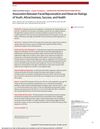Association of Hair Loss With Health Utility Measurements Before and After Hair Transplant Surgery in Men and Women
September 2018
in “
JAMA Facial Plastic Surgery
”

TLDR Hair loss greatly lowers perceived health in both genders, and hair transplant surgery notably improves this.
The study conducted at the Harvard Decision Science Laboratory with 308 adult participants found that alopecia, or hair loss, significantly decreased health utility measures in both men and women, with women's scores slightly lower than men's. Health utility was assessed using visual analog scale (VAS), standard gamble (SG), and time trade-off (TTO) methods to quantify quality-adjusted life years (QALYs). The results indicated that male and female alopecia had mean health utility measures of 0.85 and 0.83 (VAS) respectively, which were significantly improved following hair transplant surgery, with increases of +0.10 for females and +0.08 for males on the VAS. The study concluded that hair loss has a considerable negative impact on perceived health, similar to that of monocular blindness, and that hair transplant surgery can significantly improve this perception.













